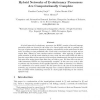Free Online Productivity Tools
i2Speak
i2Symbol
i2OCR
iTex2Img
iWeb2Print
iWeb2Shot
i2Type
iPdf2Split
iPdf2Merge
i2Bopomofo
i2Arabic
i2Style
i2Image
i2PDF
iLatex2Rtf
Sci2ools
100
click to vote
ACTA
2005
2005
Hybrid networks of evolutionary processors are computationally complete
A hybrid network of evolutionary processors (an HNEP) consists of several language processors which are located in the nodes of a virtual graph and able to perform only one type of point mutations (insertion, deletion, substitution) on the words found in that node, according to some predefined rules. Each node is associated with an input and an output filter, defined by some random-context conditions. After applying in parallel a point mutation to all the words existing in every node, the new words which are able to pass the output filter of the respective node navigate simultaneously through the network and enter those nodes whose input filter they are able to pass. We show that even the socalled elementary HNEPs are computationally complete. In this case every node is able to perform only one instance of the specified operation: either an insertion, or a deletion, or a substitution of a certain symbol. We also prove that in the case of non-elementary networks, any recursively enumer...
ACTA 2005 | Node | Output Filter | Point Mutation |
Related Content
| Added | 15 Dec 2010 |
| Updated | 15 Dec 2010 |
| Type | Journal |
| Year | 2005 |
| Where | ACTA |
| Authors | Erzsébet Csuhaj-Varjú, Carlos Martín-Vide, Victor Mitrana |
Comments (0)

